08/09/2009 Visit Colin Richardson’s blog http://colinrichardsonjazz.typepad.com/blog/
Colin Richardson Interview Part 7
AFTER COLOSSEUM – EMA
When Colosseum folded at the end of October 1971, I left the Bron Organisation to set up the London office of EMA, the Swedish tour promoters that I had been working with on all of Colosseum’s Scandinavian dates. I had a very good working relationship with Thomas Johansson, one of the directors, and he had broached the idea when he heard that Colosseum were breaking up. I liked the proposition and we agreed terms. I then had to find offices, organise equipment and furniture etc. Luckily, I had persuaded Jan, my incredibly efficient secretary/p.a. at Bron, to come with me and she helped with all the logistical stuff that had to be got together in very short order. We got some music press coverage and this brought forth a few record company contacts asking if we could manage their artists..Nat Joseph at Transatlantic and Dave Howells at MCA come to mind. Our main role though, was to effect the Musician Union‘s exchange requirements for the British name bands that EMA were importing, i.e. a 5 piece group playing 4 dates = 20 man/days, which had to be matched by a 3 piece Scandinavian group (like “Made in Sweden“) playing 7 dates/21 man/days. This wasn’t easy, as these bands were completely unknown in the UK, so would be working for very low fees, thus the cost of the tour invariably exceeded the income and this shortfall was covered by the Swedish company as an ‘overhead‘.
After getting things set up and running as smoothly as possible, I began to realise that the cost of running the office, together with my and Jan’s salaries, was quite a burden on the parent company and there wasn’t much in the way of income either, About this time, I was approached by Tony Stratton-Smith, boss of Charisma Records, who asked if I interested in joining the label. So I suggested to Thomas that costs would be greatly reduced if I handed everything over to Norman Haines, who had been working with us while managing “Gringo“, an MCA artist who had conveniently just broken up. I knew Norman could easily run things from his own apartment, which would save on office costs, plus he would be quite happy with a lower salary than EMA were paying me.
So the transfer was effected and I joined Charisma..
MY CHARISMA YEARS (1972 -76) AND MY SUBSEQUENT RETURN TO ARTIST MANAGEMENT
I spent 4 years with Charisma Records, most of them as International Manager, which meant that I travelled
a lot, mostly around Europe, liaising with the various label licensees and their press/promotion departments. I also made several trips to America, once with the ‘boss’, who insisted we flew First Class and took a suite at the Algonquin Hotel, where the famous “New Yorker” writers (James Thurber, S.J.Perelman, Robert Benchley, Dorothy Parker etc etc…) met for their ’round table’ meetings. The main Charisma artist at the time was, of course, Genesis…who were just beginning to really take off when I joined in June 1972. They were exciting times and I thoroughly enjoyed working with Tony Stratton Smith. I had a lot of respect for his way of working, which was often bold and sometimes risky, but always interesting. His musical maxim was “anything good of its kind” and he gave a lot of artists a chance who wouldn’t have got
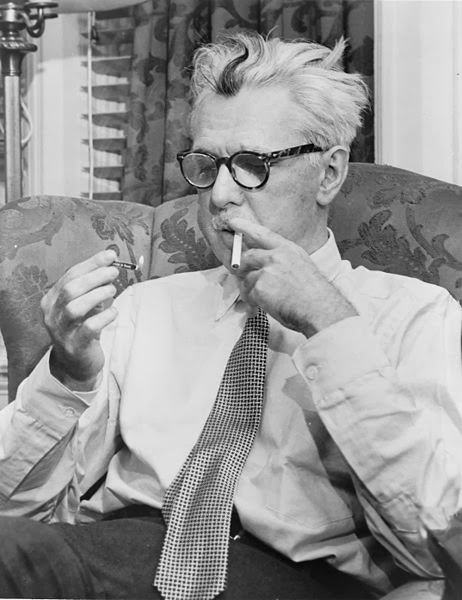 |
| James Thurber |
the time of day from most other labels. Charisma release many ‘off-the-wall’ albums, like those from Sir John Betjeman and Bo Hansson’s “Lord of the Rings“, not forgetting the fabulous Bonzo Dog Doo-Dah Band / Vivian Stanshall and Monty Python releases. It was good to have the opportunity to work with such a variety of artists, especially the last two, as our paths had already crossed back in my Bron days. I have fond recollections of touring in Germany with the Bonzos and a flying promotional visit to Copenhagen with the two ‘Python’ Terrys (Jones and Gilliam) to do some press interviews.
After 4 years though, I sensed that things were changing somewhat. ‘Strat‘ wasn’t around quite as much and eventually announced that he was bringing in someone to be ‘him’ on a daily basis, as he wanted to spend more time with his other love; ‘horse-racing’.
Right about this time I was approached by Bruce May (brother of Ralph McTell), who suggested that, if I
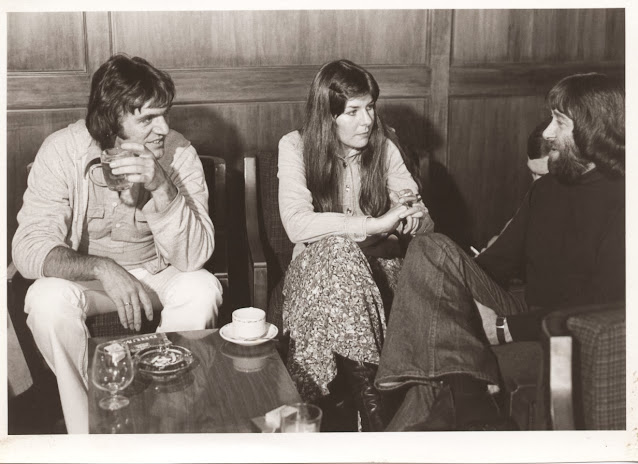 |
| Colin Richardson interviewing Ralph McTell |
joined his company, working with people like Bert Jansch, John Martyn, Ralph etc...I would also have the freedom to bring in other artists of my choice. At the time, Neil Ardley, my old friend from the NJO days, had just recorded his best and most commercial album to date “Kaleidoscope of Rainbows” and I saw a chance to be involved with getting Neil a recording & publishing deal, if I accepted Bruce’s offer. So I did. At first, it seemed that I had made a sound choice. My first job was to fly out and join Ralph McTell on his Australia / NZ tour, which was a fantastic experience, the climax of which was his appearance at the Sydney Opera House. The Ardley album eventually came out on Gull, a newly formed label run by two guys I knew when they both worked at MCA..Derek Everett and David Howells. They were enthusiastic jazz buffs and were very keen to release Neil’s album. It garnered some amazing reviews (for a jazz album), Melody Maker comparing it to a jazz version of “Tubular Bells“. High praise indeed. It sold well enough, but its market was always going to be fairly limited. It did, however, establish Neil as one of the most innovative composer/arrangers around.
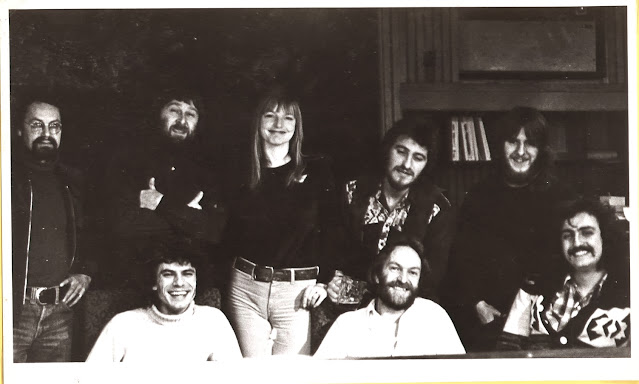 |
| Colin Richardson with Neil Ardley and musicians from “Kaleidoscope of Rainbows” |
But, after being there almost a year, I began to feel that perhaps it might not have been such a good decision after all and when a US tour for John Martyn hit problems with the support funding promised by his American label boss..I found myself in an impossible situation, which ultimately led to my parting company with Bruce May Management.
It wasn’t great timing! The record industry was going through tough times on the back of the oil crisis and the resulting vinyl shortage. No-one was hiring and nobody in a good executive position was moving! I was also pretty unimpressed with the new wave of “punk” bands that seemed to have blown all the established rock groups temporarily out of the water! So, I considered my position for a while, thinking “something will turn up”. Well, after about a year…something did. An old friend from my earlier association with Phonogram, Ralph Mace, who was now working at RCA, phoned me and offered a 3 month consultancy position covering the up-coming European tours for David Bowie and Jefferson Starship. It appeared that their International Manager had departed suddenly leaving them with no-one to ride ‘shotgun’ on these two important tours.
THE “JOURNALIST” YEARS
Almost at the same time, a German promoter that I had worked with briefly (well, one booking of the Who, actually) tracked me down and asked what I was doing. I tried to put the best possible ‘spin’ on my situation…but ultimately, I had to admit, I wasn’t doing anything much! He then told me that he was, in fact, the publisher of a major German musician’s magazine called “Fachblatt“, which he compared to International Musician in the States, in that it was about the technology..instruments, amps, PAs etc. and would I be interested in working as a journalist for the magazine. He ignored my assertion that I wasn’t, and never had been, a journalist, saying that, with my background and experience, I could get to the kind of musicians that he wanted interviews from and all I had to do was ask the right questions…which he would brief me on, to start with. Well, I decided to give it a try, but explained that I couldn’t start right away as I had already committed to the 3 month stint with RCA, . So, I worked the 3 month contract, which I will gloss over, as it could almost be another book in itself! Then, ironically, I was offered the job permanently, but I decided to stick with the journalist plan and, somewhat regretfully, passed on the RCA offer.
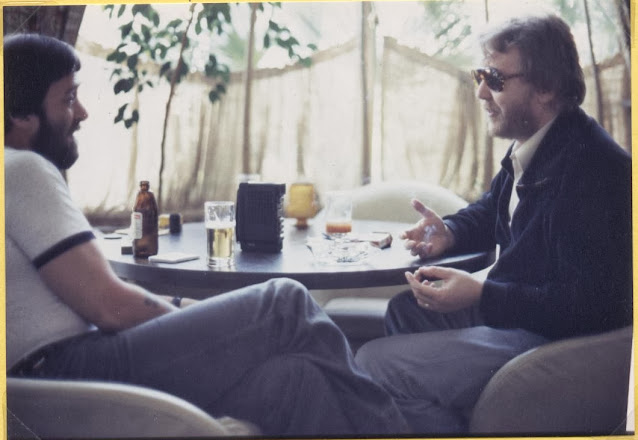 |
| Colin Richardson Interviewing Harry Nilsson at the Algonquin Hotel |
So, using a few of my contacts, I very quickly got interviews with people like Pete Seeger, Harry Nilsson, (see more about Nilsson interview here) Mark Knopfler of Dire Straits and old mates like Manfred Mann and Dave Greenslade. Then Phil Collins, Mike Rutherford and Tony Banks of Genesis were enlisted and a bit later on, an Abbey Road interview with Paul McCartney! I also persuaded another old mate, Jon Hiseman, to contribute a regular drum column. Things had got off to a pretty good start. I continued getting good interviews, some in Germany and then I made a trip to the States, where I brought off what I thought was a terrific coup. A photographer I was using for pictures to go with the interviews, told me that International Musician had secured an exclusive interview with Keith Richards. As it turned out, I knew a guy at IM from the time he had worked at Atlantic Records in L.A. I made contact and asked if Fachblatt could buy the German language rights to the article. He invited me up to meet the Publishers and negotiate directly with them. I got the deal for $500, which I thought was a ‘steal’. Following through, I then negotiated an running option to reprint any interview printed in International Musician and the sister mags, Contemporary Keyboards and Frets, on condition that they didn’t appear until 3 months later. What I hadn’t realised at the time was that, this deal effectively rendered my role redundant, a fact which eventually dawned on Fachblatt’s publisher. At that point, I was history! So was my ‘journalist career’!
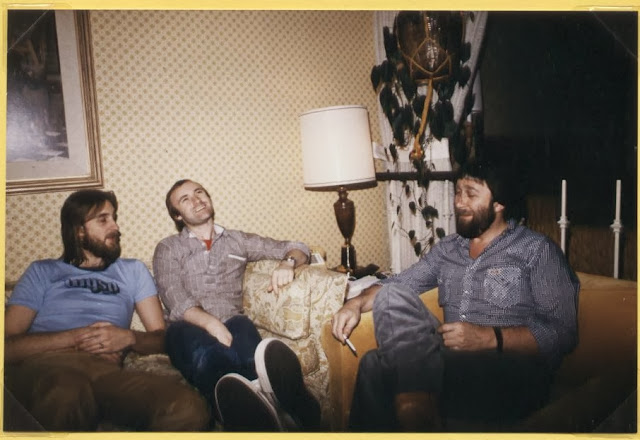 |
| Colin Richardson interviewing Mike Rutherford and Phil Collins |
By this time, I was thoroughly disillusioned with the whole music biz… its shallowness and cynicism..its lack of any entrepreneurial foresight and the prevalence of “suits”; (accountants and lawyers) who seemed to be calling all the shots. I had had enough!
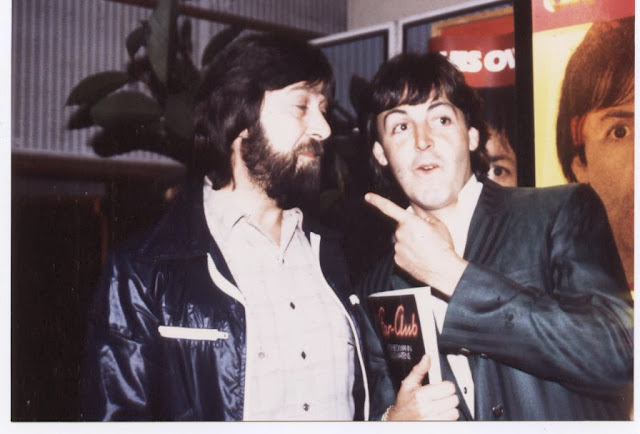 |
| Colin Richardson interviewing Paul McCartney at Abbey Road |
Colin Richardson’s unpublished interview with Paul McCartney at Abbey Road, May 1980. Listen to it here.
http://a2.typepad.com/6a0133f3fc567f970b0134871d6e62970c-mp3

